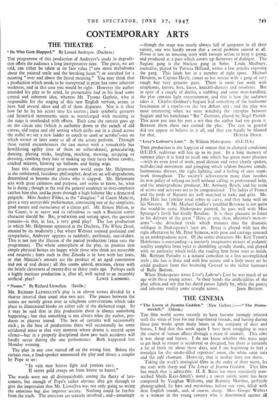CONTEMPORARY ARTS
THE THEATRE
"He Who Gets Slapped." By Leonid Andreyev. (Duchess.)
THE programme of this production of Andreyev's study in degrada- tion offers the audience a long interpretative note. The piece, we are told, can either be taken at its face value (" one more melodrama about the painted smile and the breaking heart ") or searched for a meaning "over and above the literal meaning." You may think that a production which needs to be interpreted in print has some inherent weakness, and in this case you would be right. However the author intended his play to be acted, he presumably had in his head some central and coherent idea, whereas Mr. Tyrone Guthrie, who is ,responsible for the staging of this new English version, seems to have had several ideas and all of them disparate. Nor is it clear how far he let his actors into his secrets ; their symbolic gestures and hysterical movements seem as overcharged with meaning as the stage is overloaded with effects. Each time the curtain goes up on the circus tent (which is authentic down to the stench of old canvas, old ropes and old netting which drifts out in a cloud across the stalls) we see a new ladder or couch or stool or acrobat's-net on which sooner or later some or all of the actors perform. Through these varied encumbrances the cast moves with a remarkable but bewildering agility (one of them on roller-skates), gesticulating, dancing, playing tricks, laughing, mocking, mewing, stripping or dressing, combing their hair or making up their faces before tawdry, cracked mirrors, blowing up 'balloons and fitting wigs.
Into this disintegrated green-room world steps Mr. Helpmann as the embittered, fastidious philosopher, dead set on self-degradation, determined to become the clown who is slapped. Mr. Helpmann acts with great calmness and purpose, and seems to know, he, what he is doing ; though at the end the general tendency to over-emphasis catches him also, andlte peers through a high balcony like a demented gargoyle. Miss Audrey Fildes, as the " daughter " of Count Mancini, gives a very serviceable performance, convincing one of the simplicity, good nature and insouciance of a circus girl. Mr. Ernest Milton, as the Count, is as suave and as ridiculous as such a Russian comic character should be. But, production and setting apart, the question remains—is this, in fact, a very good play? The last production in which Mr. Helpmann appeared at the Duchess, The White Devil, amazed by its modernity ; but where Webster seemed profound and sympathetic, Andreyev appears as suddenly, perilously, out-of-date. This is not just the illusion of the period production (1920 says the programme). The whole atmosphere of the play, its premiss that simple physical beings are happy while those who think are miserable and neurotic ; hints such as that Zinaida is in love with her lions, or that Mancini's amours are the product of an aged convention and not of real desire ; all this seems unreal, precious, clever with the brittle cleverness of twenty-five or thirty years ago. Perhaps such a highly intricate production is after all, well suited to an incurably


































 Previous page
Previous page